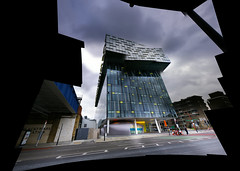
The London Development Agency, in Soutwark; stitched from about 40 photographs using Hugin.
If and when I have a thought, and have ten minutes in the office, I might write mildly diverting thoughts here: about new media in real life, about the web, about the future. But mostly, I think, I'll just wiffle about nothing.

4 comments:
You do realise if they'd moved a bit further back they'd have been able to fit it all in in one picture in the first place?
Bless technology, but some people tend to pray to it.
Depends, really - how good are you at walking through solid brick, Anonymous? Because there are some fairly hefty buildings directly behind the view point.
Even with a relatively wide angle lens, and being stood well back, you can frame barely a quarter of the angle of this shot.
The point of playing with hugin is actually to get the hang of photo stitching in order to produce perspective corrected images of much wider angles - for instance, 360 Degrees - than is possible with a regular lens.
The other thing about technology obsessives is that they tend to not have much of a sense of humour.
Which sounds harsher than I mean it to sound, dear Kim, but come on, there's much more to life than fetishising bits of software!
... well, again, it depends.
There's a little phrase - 'any sufficiently advanced technology is indistinguishable from magic'. If you want to consider magic as the totemic, and hence elide in to that good old kosher definition of the fetish, then yes; software fetish is a great way of looking at it.
I could go on at length as to why I took the photos, why I'm interested in playing with the stitching technology, the Hockney photomontages I was thinking about when I put the image together, the long artistic tradition of 'distorted' perspective images in painting, the mutliple viewpoints of cubism... in fact a long list of 'images produced only because the artist engaged with the available image making technology in a playful way'. I'm not claiming great artistic merit for this image - although I do like it - but how can you hope to make something new, and good, if you don't learn your craft first? Technology - in this case, digital photography and image processing software - gives us a new set of image making tools, and a new language, and new potential for 'how a picture can be' that we've only just started to investigate. In the same way that film photography changed painting... how will digital photography change image making?
As for naming the software; well, it took me a long while to trawl through various open source software sites to find it; what they were mostly missing was images made with the software. Naming the software feeds google, which is a nice and helpful thing to do.
As for my sense of humour - dear Anonymous, I assume you know me in person, based on your tone. If you know me, you'll know I'm not lacking in humour. Perhaps you should attribute the defensiveness to the fact you commented sarcasticially with no identity - how am I thus meant to judge your intention?
Post a Comment